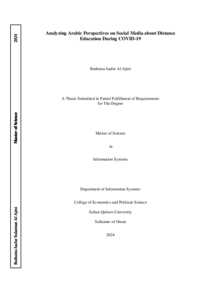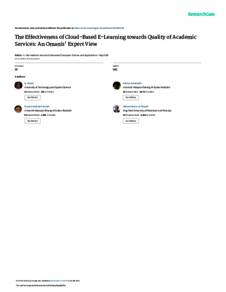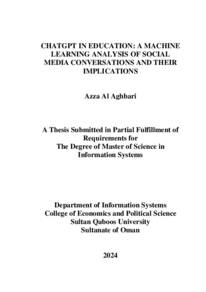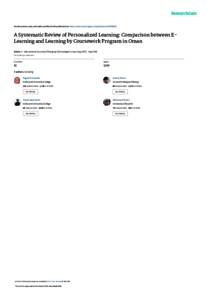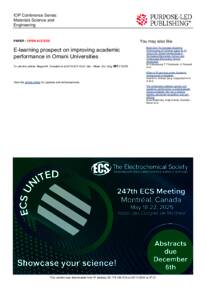وثيقة
Analyzing Arabic perspectives on social media about distance education during COVID-19.
المصدر
Master's thesis
الدولة
Oman
مكان النشر
Muscat
الناشر
Sultan Qaboos University
ميلادي
2024
اللغة
الأنجليزية
نوع الرسالة الجامعية
Master's thesis
الملخص الإنجليزي
The global upheaval caused by the COVID-19 pandemic necessitated a rapid
transition to online education, profoundly impacting students worldwide. This study
focuses on a crucial aspect of this shift—the experiences of Arabic speakers
engaging in distance education, an uncharted territory for many. Utilizing Twitter as
a primary data source, we conducted manual content and sentiment analysis on 1183
tweets to gain nuanced insights into how Arabic users perceive and navigate this
educational transformation.
Our research delves into the unique challenges faced by Arabic speakers who are
navigating distance education for the first time. By employing manual content
analysis, we identified key themes, including health and safety concerns, academic
obstacles, and psychological impacts. User roles were discerned through Twitter
bios, revealing perspectives from parents, students, teachers, and others. The findings
indicate a marked preference for distance education, with overwhelmingly positive
sentiments dominating the discourse on Twitter.
Key findings encompass diverse themes, including the prioritization of health and
safety in the online learning environment, the identification of obstacles hindering
academic achievement, and a nuanced exploration of the psychological impacts of
distance education. The overwhelmingly positive sentiments expressed on Twitter
underscore a prevalent acceptance and preference for online learning within the
studied demographic. This marked preference reflects not only the adaptability of
Arabic speakers to the new educational landscape but also signals a potential
paradigm shift in their attitudes toward distance education.
This research significantly contributes to the ongoing discourse on online learning
technologies by offering valuable insights into the preferences and sentiments of
Arabic speakers. As educational landscapes continue to evolve in response to the
pandemic, our findings provide a foundation for further discussions on refining and
enhancing online learning methodologies to align with the needs and preferences of
Arabic-speaking students.
الملخص العربي
الاضطراب العالمي الذي تسببت فيه جائحة كوفيد19- استدعى الانتقال السريع إلى التعليم عبر الانترنت، مما أثر بشكل عميق على الطالب في جميع أنحاء العالم. يركز هذا البحث على جانب حاسم من هذه التحولات - تجارب الناطقين باللغة العربية الذين يشاركون في التعليم عن بُعد، وهو مجال غير مكتشف بالنسبة للكثيرين. باستخدام تويتر كمصدر رئيسي للبيانات، قمنا بتنفيذ تحليل محتوى وتحليل المشاعر يدويًا على 1183 تغريدة للحصول على رؤى مفصلة حول كيفية تصور المستخدمون العرب وتجاوزهم لهذه التحولات التعليمية. يغوص بحثنا في التحديات الفريدة التي تواجه الناطقين باللغة العربية الذين يخوضون تجربة التعليم عن بُعد للمرة الاولى. من خالل تحليل المحتوى يدويًا، حددنا مواضيع رئيسية، بما في ذلك القلق بشأن الصحة والسلامة والعقبات الاكاديمية والتأثيرات النفسية. تم التعرف على أدوار المستخدمين من خالل السير الذاتية على تويتر، كاشفة عن آراء الاباء والامهات، والطالب، والمعلمين وغيرهم. تشير النتائج إلى وجود تفضيل واضح للتعليم عن بُعد، حيث تسيطر المشاعر الايجابية بشكل كبير على الحوار على تويتر. تتنوع النتائج الرئيسية وتشمل مواضيع مختلفة، بما في ذلك التركيز على الصحة والسالمة في بيئة التعلم عبر الانترنت، وتحديد العقبات التي تعيق التحصيل الاكاديمي، واستكشاف دقيق للتأثيرات النفسية للتعليم عن بُعد. تسلط المشاعر الايجابية السائدة المعبر عنها على تويتر الضوء على قبول وتفضيل واسعين للتعلم عبر الانترنت ضمن الفئة المدروسة. يعكس هذا التفضيل الملحوظ ليس فقط قابلية الناطقين باللغة العربية للتكيف مع المشهد التعليمي الجديد، ولكنه يشير أيضا إلى تحول محتمل في آرائهم تجاه التعليم عن بُعد.
قالب العنصر
الرسائل والأطروحات الجامعية

